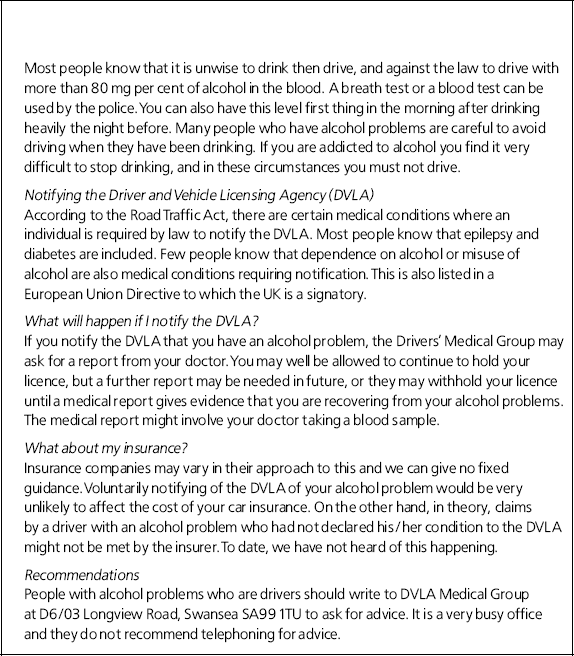Sir: Further to the paper by Bradbeer et al (Psychiatric Bulletin, July 2001, 25, 252-254) and the letter of Kirk et al (Psychiatric Bulletin, November 2001, 25, 452), please see Box 1 below, which is available at our in-patient alcohol treatment facilities. The leaflets are taken away and at least sometimes read, judging by the questions that patients ask us. We agree with the difficulties noted by Kirk et al in bringing up the issue in the clinical interview in some instances where patients are ambivalent about their attendance at the clinic.
Box 1. Alcohol, driving and the law (Chick & Ritson correspondence)

| Most people know that it is unwise to drink then drive, and against the law to drive with more than 80 mg per cent of alcohol in the blood. A breath test or a blood test can be used by the police. You can also have this level first thing in the morning after drinking heavily the night before. Many people who have alcohol problems are careful to avoid driving when they have been drinking. If you are addicted to alcohol you find it very difficult to stop drinking, and in these circumstances you must not drive. |
| Notifying the Driver and Vehicle Licensing Agency (DVLA) |
| According to the Road Traffic Act, there are certain medical conditions where an individual is required by law to notify the DVLA. Most people know that epilepsy and diabetes are included. Few people know that dependence on alcohol or misuse of alcohol are also medical conditions requiring notification. This is also listed in a European Union Directive to which the UK is a signatory. |
| What will happen if I notify the DVLA? |
| If you notify the DVLA that you have an alcohol problem, the Drivers' Medical Group may ask for a report from your doctor. You may well be allowed to continue to hold your licence, but a further report may be needed in future, or they may withhold your licence until a medical report gives evidence that you are recovering from your alcohol problems. The medical report might involve your doctor taking a blood sample. |
| What about my insurance? |
| Insurance companies may vary in their approach to this and we can give no fixed guidance. Voluntarily notifying of the DVLA of your alcohol problem would be very unlikely to affect the cost of your car insurance. On the other hand, in theory, claims by a driver with an alcohol problem who had not declared his/her condition to the DVLA might not be met by the insurer. To date, we have not heard of this happening. |
| Recommendations |
| People with alcohol problems who are drivers should write to DVLA Medical Group at D6/03 Longview Road, Swansea SA99 1TU to ask for advice. It is a very busy office and they do not recommend telephoning for advice. |




eLetters
No eLetters have been published for this article.